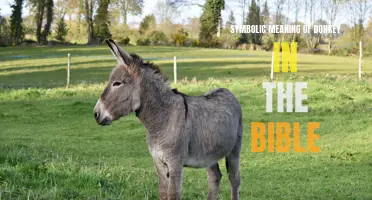
Have you ever encountered a white deer in your dreams or stumbled upon one in the wilderness? Seeing a white deer is believed to hold significant symbolic meaning in many cultures across the world. This rare and enchanting creature has captivated the minds and hearts of countless individuals throughout history. The symbolic interpretation of a white deer can vary, but it is often associated with messages of purity, spirituality, and the presence of mystical forces. In this article, we will delve into the deeper meaning behind sighting a white deer and explore the fascinating symbolism that surrounds this stunning and elusive creature. So, let's embark on a journey of discovery and unravel the mysteries of the white deer's symbolic significance.
What You'll Learn
- What are the symbolic meanings associated with seeing a white deer?
- What cultural beliefs or legends surround the sighting of a white deer?
- How does the presence of a white deer in folklore or mythology differ across different cultures?
- Are there any specific spiritual or mystical interpretations assigned to seeing a white deer?
- Can the white deer be seen as a sign or omen, and if so, what does it traditionally signify?

What are the symbolic meanings associated with seeing a white deer?
The white deer holds deep symbolic meanings in various cultures and traditions around the world. It is often considered a rare and mystical creature, believed to bring luck, prosperity, and spiritual significance. Seeing a white deer is considered a special and auspicious event, often associated with divine or supernatural forces.
In many Native American cultures, the white deer is a revered symbol of spirituality and purity. It is believed to be a messenger from the spirit world, carrying powerful messages from the divine. The sighting of a white deer is seen as a sign of blessings, guidance, and a reminder to connect with one's inner self and nature. It is also associated with the power of intuition and heightened awareness.
In Celtic mythology, the white deer is associated with the Great Goddess, who embodies femininity, fertility, and the natural world. It is seen as a representation of the sacred feminine energy and the divine connection between humans and nature. The white deer is believed to bring abundance, protection, and wisdom to those who encounter it.
In some Asian cultures, particularly in Buddhism, the white deer holds a special significance. It is often depicted as a companion of deities and is associated with compassion, virtue, and spiritual awakening. The white deer is believed to possess the ability to grants wishes and bring good fortune to those who encounter it.
In modern interpretations, seeing a white deer is often associated with guidance, transformation, and the need to trust one's instincts. It is seen as a symbol of purity, grace, and the pursuit of a higher spiritual path. The sighting of a white deer is thought to be a reminder to pay attention to one's surroundings and to be open to new experiences and possibilities.
Overall, the white deer carries deep symbolic meanings that are steeped in ancient traditions and beliefs. Its appearance is considered a rare and magical event, representing spirituality, higher consciousness, and the interconnectedness of all beings. Encountering a white deer is seen as a profound and transformative experience, guiding individuals towards a deeper understanding of themselves and the world around them.
Decoding the Mystery: Unveiling the Meaning Behind Microwave Symbols
You may want to see also

What cultural beliefs or legends surround the sighting of a white deer?
The sighting of a white deer holds significant cultural importance in many societies around the world. Across various cultures, seeing a white deer is often considered a rare and magical occurrence, invoking a sense of wonder and fascination. These sightings are often accompanied by a variety of cultural beliefs and legends that have been passed down through generations.
In some Native American tribes, such as the Ojibwe and Lenape, the white deer is regarded as a sacred animal. It is believed that the white deer is a messenger from the spiritual realm and holds a special connection to the divine. These tribes see the white deer as a symbol of purity, peace, and prosperity. It is considered an auspicious sign, indicating good fortune and blessings for the community. The sighting of a white deer is seen as an invitation to pause and reflect, offering guidance and wisdom to those who encounter it.
In certain European folklore, the white deer is associated with the realm of fairies and the supernatural. It is said that the white deer possesses mystical powers and can bring good luck or misfortune depending on the circumstances. In some legends, it is believed that capturing or killing a white deer can lead to a curse or a loss of luck. Conversely, if a person shows respect and reverence towards the white deer, they may receive blessings and protection from the fairy world.
In Asian cultures, particularly in Japan, the white deer has a strong connection to Shintoism, the indigenous religion of the country. The white deer, known as the "shirachika," is considered sacred and revered. It is believed to be a divine messenger from the gods and is seen as a symbol of purity and spirituality. The city of Nara in Japan is famous for its population of white deer, which roam freely in the local parks and are protected as a national treasure. Visitors view these deer as sacred beings and often feed them as a form of reverence.
In addition to these cultural beliefs, the sighting of a white deer also holds various interpretations in modern times. Some people see the white deer as a symbol of hope and guidance during challenging times. Others view it as a reminder of the beauty and magic that exists in the natural world. The white deer serves as a connection between the physical and spiritual realms, reminding us of the interconnectedness of all living beings.
Overall, the sighting of a white deer carries deep cultural significance and is often viewed as a rare and enchanting occurrence. Across different societies, it is associated with spirituality, good fortune, and protection. Whether through ancient legends or modern interpretations, the white deer continues to captivate our imagination and remind us of the wonder and mystery that exists in the world around us.
Understanding Chart Symbols: Decoding the Meaning Behind Graphic Representations
You may want to see also

How does the presence of a white deer in folklore or mythology differ across different cultures?
The presence of a white deer in folklore and mythology varies across different cultures, but there are often common themes and symbolism associated with this majestic creature. In many cultures, the white deer is seen as a sacred and mystical animal, often representing purity, spirituality, and good fortune. Let's explore how the symbolism and significance of the white deer differ across various cultures.
In Celtic mythology, the white deer is associated with the Otherworld, a realm of the supernatural. It is believed that encountering a white deer can bring great luck and fortune, but it is also seen as a symbol of warning or a shapeshifting entity. In Welsh folklore, the white deer is associated with the goddess Cerridwen, symbolizing her connection to the moon and the mystical aspects of nature.
In Native American cultures, the white deer holds spiritual significance and is often seen as a messenger or guide from the spirit world. It is believed to bring messages of healing, protection, and divine intervention. For some tribes, such as the Ojibwe and Lakota, the white deer is considered a sacred animal and the sighting of one is seen as a blessing from the Great Spirit.
In Chinese mythology, the white deer is associated with immortality and often depicted alongside Taoist immortals. It is believed that consuming the flesh of a white deer can grant eternal life. The white deer also represents purity and longevity in Chinese culture and is often depicted in traditional artwork and embroidery.
In Hindu mythology, the white deer is associated with Kamadeva, the god of love and desire. It is said that Kamadeva often took the form of a white deer to entice mortals with desire and passion. The white deer is also associated with Saraswati, the goddess of knowledge and wisdom, representing enlightenment and spiritual growth.
In Japanese folklore, the white deer, known as Shiroshika, is considered a sacred messenger of the gods and is believed to bring good luck and prosperity. It is often depicted in art and literature as an elegant and mystical creature, embodying beauty and grace.
In summary, the presence of a white deer in folklore and mythology differs across cultures, but there are common themes of spirituality, purity, and good fortune associated with this majestic creature. Whether seen as a guide from the spirit world, a symbol of immortality, or a connection to the supernatural, the white deer holds a special place in the hearts and imaginations of people from various cultures around the world.
Understanding the Symbol Ca2+ in Chemical Notation
You may want to see also

Are there any specific spiritual or mystical interpretations assigned to seeing a white deer?
Seeing a white deer is considered a highly spiritual and mystical experience by many cultures and belief systems. In various mythologies and spiritual practices, the white deer holds significant symbolism and is often associated with divine or otherworldly qualities. Here, we will explore some of the most prominent interpretations assigned to sightings of white deer.
One interpretation of seeing a white deer is that it represents purity and innocence. The pristine white color of the deer's coat is believed to symbolize these qualities, and encountering one can be seen as a message to reconnect with one's inner purity and strive for a more innocent perspective on life. It may serve as a reminder to let go of negativity and embrace a more positive and gentle approach to one's actions and relationships.
Another interpretation is that a white deer is a messenger from the spirit realm. In various indigenous cultures, the white deer is seen as a bridge between the physical and the spiritual worlds. It is believed that encountering a white deer brings messages from ancestors or spirit guides. It is often seen as a sign of guidance and protection, indicating that the person is on the right path or that they should pay attention to the messages the universe is sending them.
In some spiritual traditions, the white deer is associated with the moon and lunar energies. The moon has long been associated with the divine feminine and intuition. Seeing a white deer may represent a heightened connection to one's intuition and inner wisdom. It may encourage the individual to trust their instincts and rely more on their intuition when making decisions or navigating through life's challenges.
A mystical interpretation of encountering a white deer is that it can bring about transformation and spiritual awakening. The rare and elusive nature of white deer sightings is thought to be a divine intervention, signaling that significant changes are occurring or about to occur in the person's life. It may symbolize a shedding of old patterns or beliefs and the emergence of a new and awakened self.
Lastly, seeing a white deer can simply be seen as a symbol of luck and good fortune. In many cultures, white animals are considered sacred and bring blessings and prosperity. Encountering a white deer may bring about positive shifts, opportunities, and a sense of abundance in one's life.
In conclusion, the sighting of a white deer carries various spiritual and mystical interpretations. It is often associated with purity, divine messages, intuition, transformation, and good fortune. If one is fortunate enough to encounter a white deer, it is important to reflect on the personal meaning it may hold and take time to integrate its messages into one's life. The experience can serve as a catalyst for personal growth, spiritual connection, and a deeper understanding of oneself and the world.
The Fascinating World of Korean Symbols and their Meanings
You may want to see also

Can the white deer be seen as a sign or omen, and if so, what does it traditionally signify?
The white deer has long been seen as a mystical and enchanting creature in many cultures around the world. In various folklore and mythologies, the appearance of a white deer is often considered a sign or omen, with its presence holding special significance. Let's explore some of the traditional meanings attributed to the white deer.
In Celtic mythology, the white deer is associated with the otherworldly realm and is believed to be a messenger from the divine. It is seen as a symbol of purity, grace, and spiritual guidance. Spotting a white deer is considered a rare and auspicious event, often associated with good luck and the potential for positive transformation in one's life.
In Native American cultures, the white deer is revered as a sacred animal. It is believed to possess supernatural powers and is often seen as a protector or spirit guide. The appearance of a white deer is seen as a potent symbol, representing purity, spiritual connection, and the ability to see beyond the surface of things. It is also thought to bring messages from the spirit world, providing guidance and wisdom to those who encounter it.
In some European folklore, the white deer is associated with kingship and nobility. It is believed that killing a white deer would bring about disastrous consequences, such as famine or the downfall of a kingdom. The white deer is seen as a symbol of purity and divine protection, and its sighting is often considered a sign of prosperity and good fortune.
Additionally, the white deer can be seen as a gentle reminder to reconnect with nature and the spiritual aspect of life. Its presence often evokes a sense of wonder and awe, encouraging people to appreciate the beauty and magic of the natural world.
In modern times, the symbolism of the white deer has expanded beyond its traditional meanings. It is often associated with themes of hope, transformation, and the search for inner peace. The sighting of a white deer may serve as a reminder to follow one's intuition, embrace change, and seek out a deeper understanding of oneself and the world.
While different cultures and traditions may attribute slightly varied meanings to the white deer, it is generally regarded as a symbol of something special and extraordinary. Its appearance is seen as a unique and powerful occurrence, inviting individuals to consider the deeper meanings and possibilities that life may hold. Whether seen as a sign or omen, the white deer continues to capture the imagination and ignite a sense of wonder in those fortunate enough to encounter it.
The Meaning Behind Paschal Candle Symbols: Exploring the Powerful Symbolism
You may want to see also
Frequently asked questions
Seeing a white deer is often considered a symbol of purity and spiritual enlightenment. It is believed to be a sacred and rare sighting, signifying the presence of a divine or mystical presence in your life.
Yes, in certain cultures, the sighting of a white deer holds significant symbolism. For example, in Native American folklore, the white deer is considered to be a messenger from the spiritual realm, bringing messages of peace, harmony, and healing.
While the white deer is generally seen as a positive and auspicious symbol, some believe that its appearance could also be a warning or omen. It may indicate that a significant change or challenge is about to occur in your life, urging you to stay vigilant and prepared.
The location and circumstances of seeing a white deer can provide additional insights into its symbolic meaning. For example, if you encounter a white deer in a dream or during a meditation, it could indicate an upcoming spiritual journey or transformation.
Yes, the symbolic meaning of seeing a white deer can vary depending on your personal beliefs, experiences, and intuition. It is important to trust your own interpretation and reflect on the emotions and thoughts that arise when encountering this rare and magical creature.







